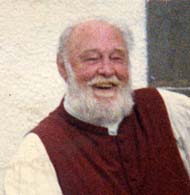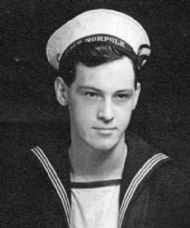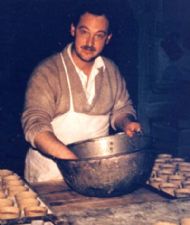 |
|||||||||
Alexander 'Alastair' Dunn 1925-2007
|
|||||||||
Alastair Dunn 1925-2007 - EULOGY
Written by Alex Dunn, and read at Alastair's Memorial Gathering on 19th February 2007Ladies and Gentlemen. We meet again. Rather sooner than some of us had expected.
Thank you all very much for coming here today. I would like to express particular thanks to the following people: To June Mackay, for her help and many kindnesses over the years; to the staff of The Marine Nursing Home, who have shown care and kindness above and beyond the call of duty, and who did more than their best to make sure that during his last days Alastair experienced as little pain and discomfort as possible; to Marigold Cameron, who was invaluable during Alastair’s first illness; to Mr. Alan Smurthwaite, for officiating at this ceremony; and to Helen, Fiona and Jane, for making the arrangements and organising the details and for not getting too impatient with the rest of us, although I’m sure we thoroughly deserved it.
Maureen Lipman was talking to an aged aunt. This aged aunt was deaf, and just slightly dottled. And for some reason they were talking about driving on the motorway. Maureen Lipman said that at least she didn’t have to keep looking upwards to make sure that people on the flyovers weren’t throwing rocks down on the cars.
The aged aunt looked startled at this, and said, “Why, did that happen often?’ Maureen Lipman replied that, yes, it used to happen quite regularly. There was a long pause while the aged aunt thought about this. Then she said, “Chinese people?” There was an even longer pause while Maureen Lipman worked this out. Then she said, “No, no, no, no, no, auntie. ROCKS. Not WOKS.”
Many of you here who knew Alastair well will know that he loved jokes and funny stories, particularly ones with strong images and word-play, and that he was quite, quite hopeless at telling them. Long before he’d reached the punch-line, long before he was even within a country mile of the punch-line, he would be convulsed with coughing and spluttering, a paroxysm of gasping, wheezing laughter, while turning an alarming shade of purple and usually having to clutch a chair or table or any unfortunate spectator near enough to stop him from falling over.
This experience almost perfectly illustrated Robert Louis Stevenson’s words, that it is better to travel hopefully than to arrive, since quite often the spectators had to make do with the admittedly very entertaining build-up, because there was never any chance at all that they would hear the punch-line. In fact, sometimes people new to this experience would actually beg Alastair not to give them the punch-line, since the imminence of Alastair’s death from laughter, or more worryingly the need to give him the kiss of life, when his false teeth had already flown across the room into the dog’s basket, seemed far too high a price to pay.
I remember one particular story, involving three politicians and a large tin of treacle, which caused Alastair particular trouble. Over a whole week whenever I asked him, begged him for the punch-line, he would open his mouth and gasp and fall over, a heap of gasping humanity useless to man or beast. Eventually, he suggested that if he went into our downstairs toilet with a piece of paper and a pencil he might be able to write it down.
Half an hour later, after noises like an elephant gargling a bucketful of trifle, he staggered up the stairs, sweating, gasping, and triumphantly holding out a crumpled bit of paper with two lines of scrawl of which I could only ever make out the words, ‘jelly babies’. It was, I have to say, one of the most frustrating experiences of my life. But Alastair enjoyed it hugely.
A minister in Achiltibuie was addressing his congregation. “And the next lesson will be read my Miss Mary MacInnes.” A voice piped up from the back of the church: “Mary MacInnes is the biggest whore in Achiltibuie!” (A long, long pause.) “Nevertheless………”
This is a ‘nevertheless’ moment. I have to say that because I don’t want Alastair’s fans, and particularly Fiona, jumping up and pelting me with rotten fruit after hearing what I’m going to say, without keeping in mind that after I’ve said what I’m going to say there will be a ‘nevertheless’.
Alastair’s life, by his own lights, was a failure. He wanted to be a painter. In fact, not only a painter but a good painter, even a great painter, one whose name would be recognised and live on as a painter. And it didn’t work. As with so much in life, it was the smaller things which carried most conviction, and in Alastair’s case these were his drawings and his designs for pottery. But painting is what artists do, so he painted; and I never knew whether he realised how much better he was as a draughtman than as a painter. I think that he did; but he preferred to treat it as a sort of joke. And he tried writing.
He wrote short stories and plays, and I even remember him trying his hand, years ago, on radio scripts, in the days when we lived in Aultbea and there was no television and newpapers arrived a day late and the radio was everything. And he could write, and he could write well; but he lacked whatever quality it is necessary to have to make his writing great. And similarly to his painting, I think that he would have had more success if he had tried memoirs and remembrance of things past; but short stories and plays are what writers write, so he stuck to his last. And it was never quite good enough for his ambition.
And sometimes I have to admit that I felt desperately sorry for him, and I wished that there was some way to flip a quality-control switch and suddenly make his painting and writing as good as he wanted them to be, as good as he thought he was capable of doing but somehow could never produce.
Nevertheless. Does it matter? No, it doesn’t, and for two reasons. The first is that, no matter how important all this was to him, it was in the end only of academic interest. He was intellectually attracted to the Gauguin story – how Gauguin abandoned his family and went off to the South Seas and painted great pictures of naked maidens – but morally he found it repugnant. He loved his wife and family and life in Cromarty far too much to approve of anything so cruel and irresponsible and what he considered to be essentially uncivilised.
And second, as most of you know, he went to Art School as a mature student in his forties, and so discovered a job he loved doing. He adored teaching art to children. In particular he loved teaching art to young children, in primary school – they were, he said, not yet shackled by ideas of what was and was not art, and he allowed them to draw and paint what they wanted. If a girl wanted to paint a picture of her mother five times bigger than her house in the same painting – why not? If the painting was fun and decorative and psychologically true, who was to say that she was doing it the wrong way?
In some ways he was a bit of a quiet revolutionary and his pupils loved his classes. I remember him telling me that he had found again and again that most children in primary school could instinctively ‘understand’ a Picasso, a Klee or a Chagall in a way that seemed to be impossible to children in secondary schools or even most adults. Significantly, when he was called to do some supply teaching in Fortrose Academy he found the experience boring and tedious and uninspiring – the pupils already ‘knew’ what art was, and they could not be persuaded to do anything else except ‘art’.
To sum up: Alastair’s failure in painting and writing was ultimately only a failure in his own head. In the things that mattered - the pottery, his teaching, the love for and of his family, his love of film and books and good food and Cromarty – he was a huge success. A towering success. And it cannot be said too frequently or too loudly: in these days of fifteen minutes of fame, of vile reality shows and fame at all costs, we need much, much more of Alastair’s kind of ‘failure’. His quiet influence through his teaching, his family and his example will be felt for years and years to come.
As you will be able to imagine, Alastair was considered as a bit of an eccentric in the schools – or at least he was considered odd by the teachers and eccentric by the pupils, but by both with affection and respect. It was an image which he welcomed and encouraged. One of the manifestations of this was his ties. He built up a huge collection of odd and colourful ties, and made a point in some of the schools in never arriving with the same tie twice. Much was the speculation in his classes about what sort of tie he would be wearing that day.
One day he turned up in a class to an unpleasant surprise: one of his favourite classes, with whom he never had any trouble, was quietly unmanageable. There was much giggling and sniggering and glancing sideways at Alastair, but no indication of what on earth was causing this anarchy. Eventually he grew impatient, and demanded to know what was going on. Silence. After much shuffling and looking at the floor a little girl slowly raised her hand. ‘Please sir…..” “Yes? Well?” “Please sir…….you’re wearing two ties.”
When I was thinking about this speech, I was reminded again just how little I knew about Alastair’s life before I was conscious enough to take things in. Like a lot of his generation who went through the war he didn’t speak much about it, preferring to put it in the past and get on with his life. Angus and I were convinced that he’d personally won the war – he even had a medal to prove it! – but he talked very little about his experiences, and when he did they were usually the more light-hearted episodes. Like being threatened with lynching by his fellow sailors because he’s said that no, actually he didn’t hate the Germans. Or the time he was thrown in jail and threatened with court-martial because he’d pretended to misunderstand orders broadcast over a defective tannoy. Or ordering a copy of “The Egyptian Book of the Dead’ from a Glasgow bookshop, and being contacted by them four years later, after the war had ended, to be told that they’d put aside the book for him and did he still want it?
If pressed he would talk about the cold and dark of the Northern Convoys, and the mountainous seas; but when he was contacted recently to talk about his experiences in the navy at that time, he wasn’t interested. And that’s how he was. He lived less in the past than practically anyone I’ve talked to of that age, and it was one of his most endearing qualities.
One last anecdote, and one of the most moving. Alison and Alastair were a wonderful partnership, and without Alison’s support and sacrifice – and that is not too strong a word – he wouldn’t have been able to achieve half of what he did. But there were rough times, as there are in every marriage. Sometimes Alastair would go in the huff, or Alison wouldn’t talk to him because she was furious, and occasionally these two states would coincide. On one occasion there was silence for four days, a silence as heavy as thunder; and on the fourth day Alison went up to their room for a nap, as she did every afternoon, and as she lay down she saw, pinned to the ceiling directly above her, a note which read, simply, “I’m sorry.”
Several weeks ago, I found in a newspaper article a quotation from Albert Einstein which perfectly encapsulates Alastair’s beliefs, or lack of them. With mild apologies to the believers in the audience, it runs as follows: “I cannot conceive of a God who rewards and punishes his creatures, or has a will of the kind that we experience in ourselves. Neither can I nor would I want to conceive of an individual that survives his physical death: let feeble souls, from fear or absurd egoism, cherish such thoughts.”
And so to last words. Alastair loved last words. A favourite expression was, “Bugger Bognor”, supposedly the last words of George V. (The history-book version is the far less interesting and frankly unbelievable, “How is the empire?”) Two others of which he was particularly fond were The Younger Pitt’s and Gertrude Stein’s. The official version of The Younger Pitt’s was: “My country; Oh, how I leave my country.” The unofficial version was: “I think I could go one of Bellamy’s veal pies.” Gertrude Stein is said to have muttered, “What’s the answer?”, followed after a long, long pause by, “Alright then , what’s the question?”
The last thing I heard Alastair say was, “Thanks”, after Colin had pulled a quilt up over his shoulder, which is a polite and gracious word with which to end a long, rich life. However, I would like to end with some words from The Bible.
Alastair loved The Bible, and he loved the paradox that he, an atheist, could love The Bible. He loved the fact that, though translated and collated by a committee it contained some of the most wonderful and awe-inspiring poetry in the English language. He would quote obscure passages, usually to do with violent deaths or sexual congress with animals, at the most inappropriate moments.
And I would like to close with the last words of Christ, which are three of the most moving and at the same time most dangerously ambiguous words in the entire book, but which in Alastair’s mouth would have been much more definite:
It is finished. It is finished.
 Birth: 22 Nov 1925
Birth: 22 Nov 1925
